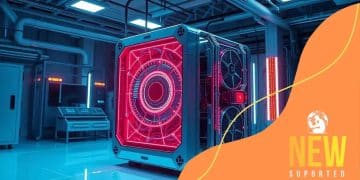Nvidia’s $500B AI investment: what it means for you

Nvidia’s $500B AI investment will enhance consumer products and services through personalized experiences, faster solutions, and improved technology while addressing key issues like data privacy and ethical AI use.
Nvidia’s $500B AI investment is turning heads in the tech world. But what does it really mean for you and the industry? Let’s dive into the details and uncover the potential changes on the horizon.
The scale of Nvidia’s investment
Nvidia’s investment of $500 billion in AI is monumental. This amount underscores the company’s commitment to artificial intelligence and its potential to reshape industries.
Understanding the Scale of the Investment
This investment covers a range of initiatives from hardware advancements to software development. With such a vast budget, Nvidia aims to pioneer breakthroughs across various technology sectors.
Key Areas of Focus
- Data Centers: Enhancing computing power for AI processing.
- Machine Learning: Innovating algorithms that enable better decision-making.
- Healthcare: Developing AI solutions for diagnostics and treatment.
- Autonomous Vehicles: Investing in AI for safer transportation technologies.
Another critical aspect of this investment is the collaboration with startups and tech firms. Nvidia recognizes that to realize the full potential of AI, partnerships are essential. These collaborations will foster innovation and accelerate the development of cutting-edge technologies.
The investment also caters to the expansion of AI infrastructure. Building more data centers will provide the necessary resources for training complex models. This expansion is vital in keeping pace with the rising demand for AI capabilities.
Ultimately, the scale of Nvidia’s investment in AI may redefine how industries operate. By allocating such significant funds, Nvidia is setting the stage for exponential growth in AI technologies.
Key areas targeted for AI development
Nvidia’s vast investment highlights several key areas targeted for AI development. Each area represents a significant opportunity for innovation and progress in technology.
Advancements in Computer Vision
One critical focus is computer vision, which enables machines to interpret and understand visual information. This technology is vital for sectors like healthcare, where it can assist in diagnosing diseases from medical imaging.
Natural Language Processing (NLP)
Natural Language Processing is another area ripe for development. It allows machines to understand, interpret, and respond to human language. This technology powers chatbots, virtual assistants, and more, transforming customer service.
Robotics and Automation
Nvidia also aims to enhance robotics and automation. With improvements in AI, robots can perform complex tasks more efficiently, from manufacturing to logistics. This evolution is essential for industries looking to optimize operations.
- Smart Cities: AI can improve traffic management and public safety.
- Financial Tech: Machine learning is used to detect fraud and optimize investments.
- Gaming: AI creates more immersive experiences and dynamic environments.
In the realm of AI for gaming, Nvidia’s developments enable real-time graphics rendering, leading to lifelike visual experiences. These advancements push the boundaries of what is possible in digital entertainment, attracting more players and enhancing engagement.
By targeting these key areas for development, Nvidia positions itself at the forefront of technological innovation. From healthcare to entertainment, the impact of this investment will be felt across multiple sectors.
Implications for tech industries

The implications for tech industries stemming from Nvidia’s massive investment are profound. As AI technology evolves, businesses must keep up with the trends to remain competitive.
Increased Demand for AI Solutions
With Nvidia leading the way, companies across sectors will feel pressure to adopt AI solutions. This demand creates opportunities for innovation as businesses seek to integrate advanced technologies into their operations.
Impact on Job Roles
The rise of AI will also transform job roles within tech industries. Professionals with skills in machine learning, data analysis, and AI development will be in high demand. Training and education programs will need to adapt to prepare the workforce for these changes.
- Job Creation: New roles in AI development and maintenance.
- Skill Shifts: Emphasis on digital skills and continuous learning.
- Collaboration: More teamwork between tech and non-tech roles.
Additionally, businesses must invest in infrastructure to support AI technologies. This can include upgrading hardware, software, and data management systems. Companies that can effectively harness AI will achieve greater efficiency and cost-effectiveness.
As tech industries respond to these changes, competition will intensify. Organizations that quickly adopt AI strategies will likely gain a significant edge in the market. This rush towards innovation may foster collaborations and partnerships for shared knowledge and resources.
Furthermore, ethical considerations surrounding AI cannot be overlooked. Companies must navigate the challenges of ensuring responsible and fair use of AI technologies. Balancing innovation with ethical practices will be crucial for long-term success.
Potential challenges ahead
While Nvidia’s investment represents a significant opportunity for growth in AI, several potential challenges ahead could impact the journey.
Technological Hurdles
One major challenge is keeping up with the rapid pace of technological changes in the AI sector. Maintaining up-to-date hardware and software is crucial, but it can also be costly and complex. Companies must ensure they are not left behind as new advancements are made.
Data Privacy Concerns
Another pressing issue relates to data privacy. As AI systems rely on massive datasets, protecting users’ personal information becomes paramount. Organizations must find a balance between utilizing data for AI development and safeguarding sensitive information.
- Compliance with regulations: Adhering to laws like GDPR can be challenging.
- Building trust: Users need assurance that their data is handled responsibly.
- Transparency: Companies should be open about data usage to foster trust.
Moreover, the ethical implications of AI use are becoming increasingly significant. Businesses face the task of ensuring their AI applications do not lead to biased or unfair outcomes. Implementing fair algorithms and testing outcomes will be critical to addressing societal concerns.
Additionally, as AI technologies become more prevalent, job displacement is a real concern. Automation may lead to changes in the workforce, requiring retraining and support for those affected. Organizations will need to be proactive in addressing these workforce impacts to maintain a positive public image.
Finally, competition in the AI space is fierce. Many companies are vying for leadership in AI technology, which means that Nvidia and others must continually innovate. Staying ahead of competitors requires significant investment in research and development and can be challenging in a crowded market.
What this means for consumers
Nvidia’s investment in AI significantly impacts consumers in various ways. As the technology evolves, users can expect improved products and services tailored to their needs.
Enhanced User Experience
With AI advancements, companies can offer more personalized experiences. For instance, AI algorithms analyze consumer preferences, helping businesses recommend products that suit individual tastes.
Faster and Smarter Solutions
As Nvidia focuses on AI development, consumers can look forward to faster solutions in everyday tasks. Whether it’s through smart home devices or AI-powered apps, these innovations will simplify daily life.
- Better customer service: AI chatbots provide instant responses to common inquiries.
- Improved products: AI can enhance functionality in electronics and gadgets.
- Healthcare advancements: AI applications can lead to quicker diagnoses and treatment options.
Additionally, the influence of AI on sectors like retail and transportation will likely lead to more efficient services. For example, AI can optimize supply chains, ensuring products reach consumers faster than ever before.
Moreover, with Nvidia’s investment, there is potential for breakthroughs that enhance personal safety. From improved security features in smart devices to advancements in autonomous vehicle technology, consumers will benefit from a safer living and traveling environment.
However, as AI becomes more integrated into our lives, consumers should remain aware of ethical implications and data privacy concerns. Companies must prioritize transparent practices to build trust among users, ensuring their data is handled responsibly.
Overall, Nvidia’s commitment to AI signifies a shift toward a more innovative and consumer-friendly landscape. As technology evolves, consumers will enjoy greater convenience, personalized services, and enhanced security measures.
In conclusion, Nvidia’s $500B AI investment marks a pivotal moment for technology and consumers alike. With significant implications across various industries, this investment promises enhanced experiences and new innovations. As AI develops, consumers can look forward to personalized services and improved products that make daily life easier. However, it is essential for companies to remain mindful of ethical considerations and data privacy as they navigate this rapidly changing landscape. The future holds great potential for those who embrace AI, creating a smarter and safer world for everyone.
FAQ – Frequently Asked Questions about Nvidia’s AI Investment
How will Nvidia’s AI investment improve consumer products?
Nvidia’s investment will lead to more personalized and efficient products, enhancing user experience across various industries.
What are the ethical implications of AI advancements?
Organizations must ensure responsible use of AI, focusing on data privacy and fairness to build consumer trust.
How can consumers benefit from AI innovations?
Consumers can expect faster solutions, better customer service, and safer technology as AI technologies develop.
What challenges might consumers face with increasing AI integration?
Consumers may encounter issues with data privacy and the need for transparency in how their data is used.






